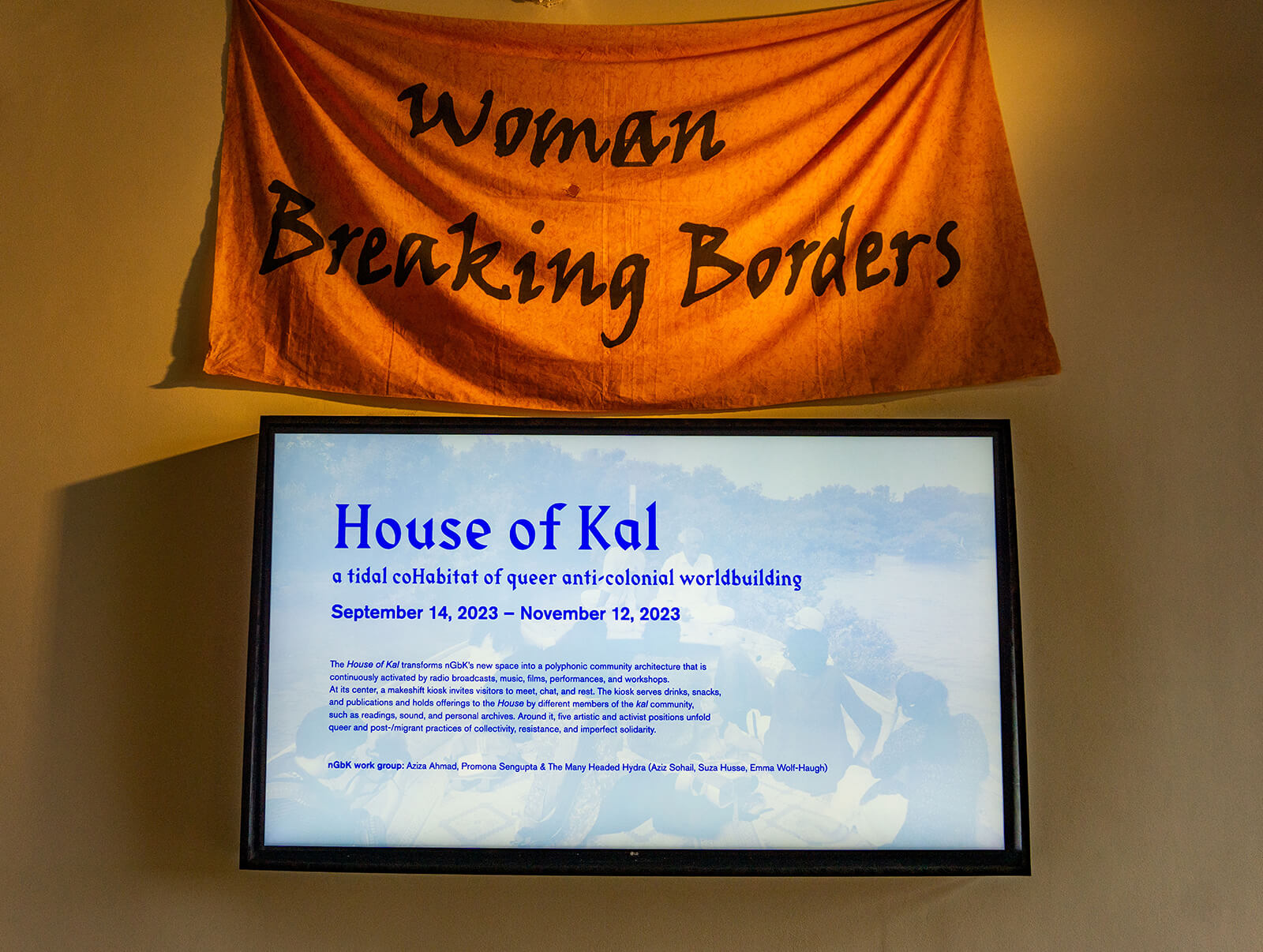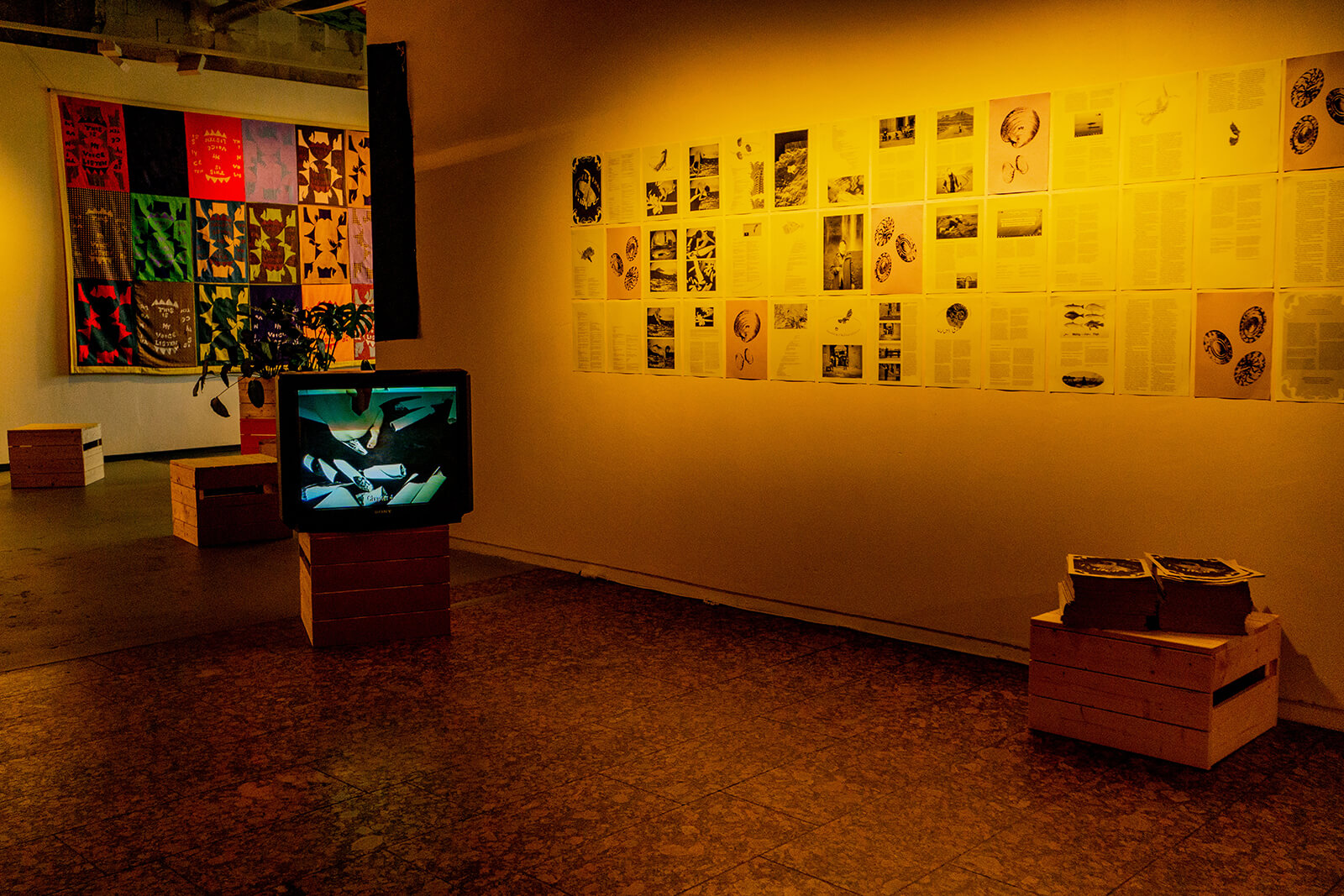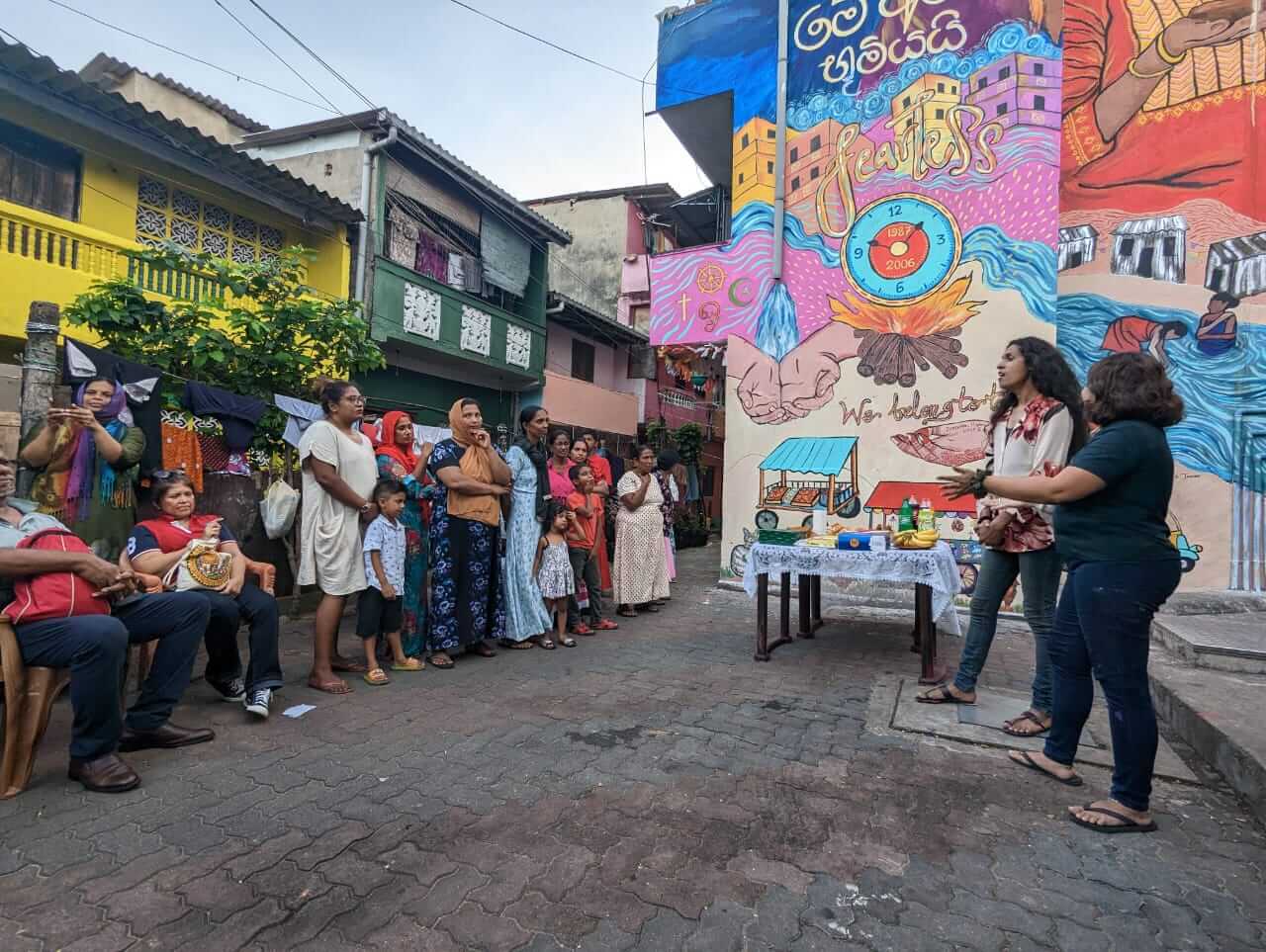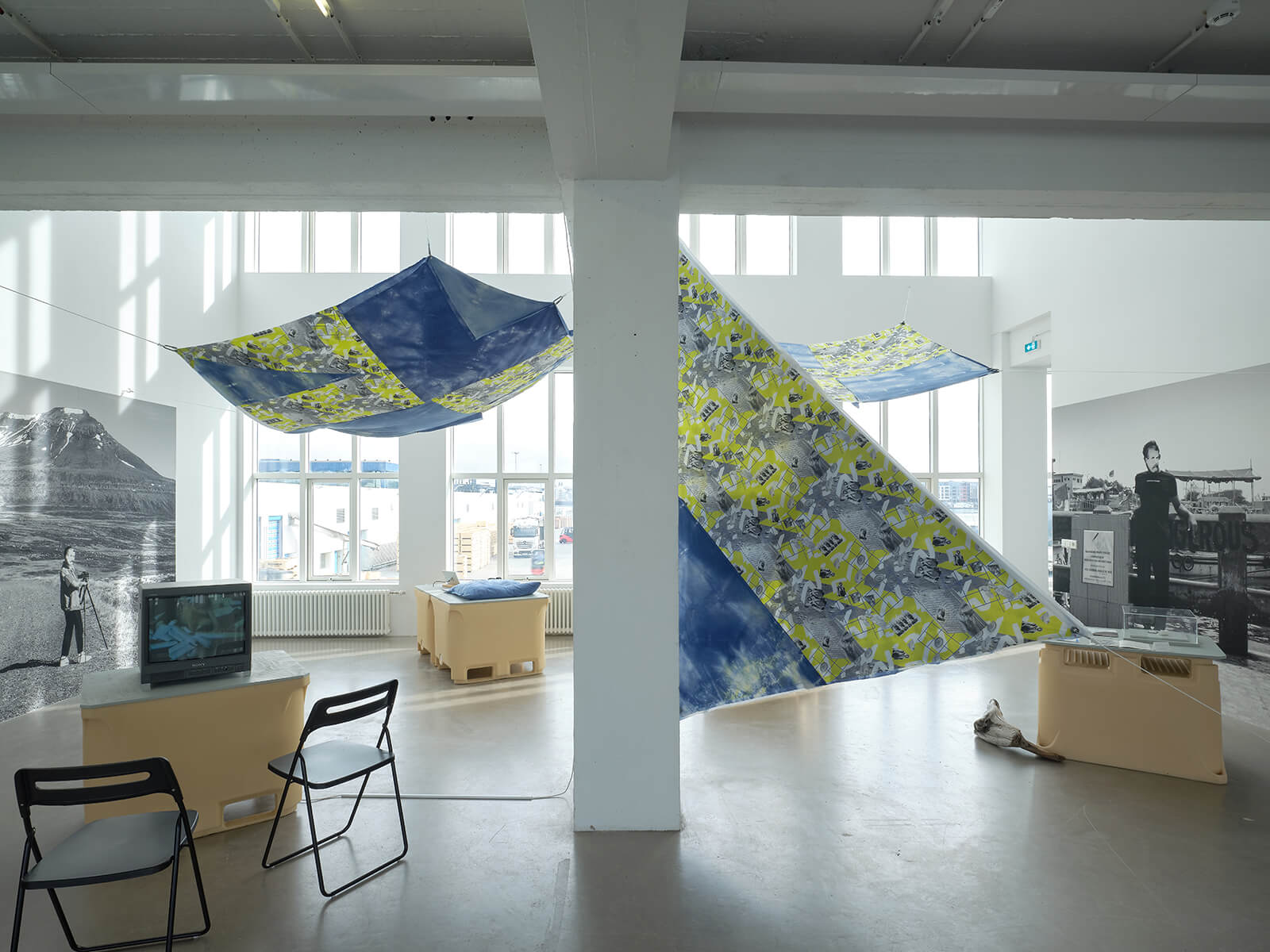Delaine Le Bas on language and power, and making interactive art
by Srishti OjhaMay 30, 2025
•make your fridays matter with a well-read weekend
by Aarthi MohanPublished on : Nov 19, 2023
In many South Asian languages, like Hindi, Urdu and Bangla, the word Kal means both yesterday and tomorrow; a linguistic revelation inspired by a line from Fatimah Ashghar’s poem Kal became the guiding spirit for the House of Kal project. Kal is a paradoxical dance of time, pulsating as the heartbeat of an exhibition in Germany that transcended temporal confines. The project unfolded as a poetic exploration of water bodies, not just as geographical entities but as profound sites of migration, protest and extractivism. In the symphony of polyphonic community architecture, voices converged and diverged, echoing the myriad stories inscribed within the fluidity of time.
As nGbK opened its new space on Alexanderplatz, Berlin with the House of Kal, the convergence of art, history and activism became a tangible reality. The space offered a dynamic archive encapsulating anticolonial and queer methods of community-based art-making, organising, knowledge production and curating. STIR reflects on the recently concluded art exhibition, not merely as a retrospective but as a continuation of a dialogue that transcends beyond the confines of the art gallery. The House of Kal in its culmination becomes a beacon, guiding us beyond the temporal and spatial boundaries of the exhibition, prompting us to carry the conversations, narratives and lessons into our own lives and communities.
The project ingeniously orchestrated an immersive experience of an exhibition, a radio station, music, film, performance and workshop programmes. During the exhibition, a makeshift kiosk invited visitors to meet, chat and rest. It served drinks, snacks and publications while holding offerings to the house by different members of the Kal community, such as readings, sound and personal archives. This created a dynamic space where diverse artistic and activist positions interwoven modes of survival and re-imagination within the span of water-bound ecologies around the Indian Ocean, the Arabian Sea, the mother Atlantis and the River Spree. The project, at its core, proposed an anti-map of ecological practices rooted in collectiveness, resistance, world-building and imperfect solidarities.
Materially, socially, and as an ecosystem, the exhibition space acted as a 'খুঁটি' (khum̐ ṭi; transliterated as khNuti), a device used in the Bengal delta to tie down boats and cattle. It is also used to denote a spiritual and existential tether, a metaphorical stick to which one ties their hopes and desires; a means of support to hold each other. Like the khNuti hammered into the riverbank to provide a temporary home for moving entities, House of Kal offers an anchor for oceanic and riverine beings, navigating water and sound waves to connect the survival of people and communities in the Kal network.

Founded in 2020 as a transoceanic platform, House of Kal sought to create a language where yesterday and tomorrow converged. Inspired by the South Asian poet’s insight, Kal became a nomadic place for listening, music and movement, fostering vocabularies at the crossings of art, anti-colonial feminism and eco-politics. The platform’s name extends the invocation of the word Kal, shifting its meaning based on who speaks, from where and when.

From 2020 to 2022, Kal unfolded as queer houses for art and community-making in Karachi, Colombo and Berlin along with online DIY radio programs, workshops, collective publications, performances and video productions. The community was fostered amidst deep ruptures and dissonances through pandemic time, economic, political and social crises in South Asia and Europe, border regimes, ongoing wars and ecological disasters.
In its global scope, the project masterfully achieved a delicate balance, decentralising the exhibition experience. The narratives woven into the project extended far beyond the physical boundaries of any single location. This intentional decentralisation allowed for a rich tapestry of South Asian stories to unfold on a global stage. The House of Kal became a platform where the voices of Karachi, Colombo and Berlin intertwined creating a mosaic of diverse perspectives that resonated with the struggles and triumphs of communities across the Indian Ocean and beyond. We take a closer look at these narratives.
The activist group collaborated with House of Kal to present fragments of an archive reflecting the manifestations of their history of protest on water. This powerful display captured moments of resistance against borders and restrictions on movement, aligning with their broader anti-racist and anti-fascist work. From the 2014 refugee women tour on rafts to leading resistance from a raft on the River Spree, Women in Exile showcased the empowering history of collective resistance on water. The exhibition celebrated their efforts as a poignant example of solidarity amidst the ongoing Mediterranean crisis.
The Many Headed Hydra (TMHH) presented Harbour Failures, linking a future deep water harbour in Finnafjordur, Iceland with another harbour speculation in Gwadar, Pakistan. This collective, rooted in decoloniality and transoceanic affinities, sought to interrogate capitalism’s failure in the face of an expanding climate catastrophe. Through textile, video and print works, TMHH offered oracles and embodiments of radically different futures. The installations engaged artists from South Asia and post-migrant Europe, examining the impact of capitalist prophecies on Arctic extraction and geopolitical dominance.
Artist Zahabia Khozema’s work focused on the Gujjar Nullah and the Kausar Niazi colony in Karachi, Pakistan. The Gujjar Nullah, a 22-kilometre sewage and drainage stream, became a symbol of the struggles faced by working-class communities. Following heavy rains in the 2020 monsoon, the city government’s response triggered evictions despite the community’s six-decade-long presence. Khozema’s artworks gathered oral testimonies, creating site-responsive drawings and photographic installations. Through a queer and feminist lens, she depicted the collapse of urban infrastructure in Karachi, offering a powerful commentary on dispossession, abandonment and strained living conditions amidst economic crisis and state violence.

Vicky Shahjehan’s collaborative practice unfolded in the Kompanna Veediya neighbourhood, also known as 'Slave Island', in Colombo, Sri Lanka. Shahjehan engaged in creating large murals that affirmed human and land rights within the community. Her collective feminist practice served as a street-level archive, documenting marginalised histories and struggles against racism, neoliberal urban development, militarisation, extraction and poverty. Combining spiritual, healing and visualising techniques from Muslim traditions, Shahjehan’s works amplified the voices of women, trans and queer individuals, contributing to the reclamation of power in public spaces.
Unidentified Sonic Object is a collaborative radio show by Radio Kal x RadioWeAreBornFree! +Onelove Radio which became the focal point for artistic experimentation and community gathering. This space for South Asian modernity intercepted signals from the Spaceship Beben, a FLINTAQ+ run deep space exploration vehicle. Operating as a resistance against imposed worlds of capitalism, colonialism and patriarchy, this radio station created a border and dimension-crossing antennae. Through songs, conversations and imaginations, the radio station broadcasted sounds from the larger diasporic and refugee rights movements, fostering a sense of empowerment and connectivity across space and time.
Within the House of Kal, a tidal co-habitat and archive is an amorphous, organically evolving space. Inspired by the dynamic nature of tides, it proposed an ecology of visual, narrative and performance contaminations; a space for collective, learning speculating and simply hanging out. This co-habitat is a dedicated realm for knowledge production, exploring the myriad forms of life and community that emerge in the ruins left by colonialism, patriarchy and capitalism. Within the space a video-zine Rituals for Coastal Commons was projected; a collaborative work crafted by inhabitants of the Houses of Kal in 2021. The kiosk structure not only served as a visual spectacle but also held offerings to the House from different members of the Kal community, creating an immersive experience.

House of Kal, with its focus on water, time and community, unfolded as a testament to the interconnectedness of diverse narratives across geographies, culture and temporalities. The exhibition space acting as a khNuti, held the ephemeral architectures of hopes and dreams, providing a temporary home for moving entities. The conclusion of the exhibition marked not just the end of a physical gathering but the continuation of a collective dream, echoing beyond the walls of the gallery into the fluid landscapes of yesterday, today and tomorrow; a tapestry woven by the many voices of Kal.
by Srishti Ojha Oct 10, 2025
Directed by Shashanka ‘Bob’ Chaturvedi with creative direction by Swati Bhattacharya, the short film models intergenerational conversations on sexuality, contraception and consent.
by Srishti Ojha Oct 08, 2025
The 11th edition of the international art fair celebrates the multiplicity and richness of the Asian art landscape.
by Asian Paints Oct 08, 2025
Forty Kolkata taxis became travelling archives as Asian Paints celebrates four decades of Sharad Shamman through colour, craft and cultural memory.
by Mrinmayee Bhoot Oct 06, 2025
An exhibition at the Museum of Contemporary Art delves into the clandestine spaces for queer expression around the city of Chicago, revealing the joyful and disruptive nature of occupation.
 surprise me!
surprise me!
make your fridays matter
SUBSCRIBEEnter your details to sign in
Don’t have an account?
Sign upOr you can sign in with
a single account for all
STIR platforms
All your bookmarks will be available across all your devices.
Stay STIRred
Already have an account?
Sign inOr you can sign up with
Tap on things that interests you.
Select the Conversation Category you would like to watch
Please enter your details and click submit.
Enter the 6-digit code sent at
Verification link sent to check your inbox or spam folder to complete sign up process



by Aarthi Mohan | Published on : Nov 19, 2023
What do you think?